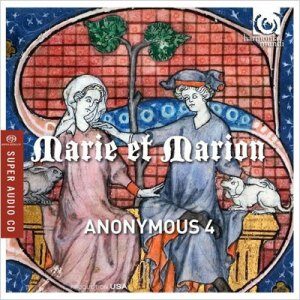The names have changed, and they’ve stayed the same–Anonymous 4 founding member Ruth Cunningham left a number of years ago and was replaced by Jacqueline Horner-Kwiatek–and a few years after that, founding member Johanna Rose departed and Cunningham returned. So long-term followers of this legendary and enormously influential quartet (conceived 28 years ago and responsible for 20-plus recordings, many of them best-sellers) justifiably will take comfort in the assumption that this new recording will retain and reflect this group’s long-established artistic standards and inimitable vocal sound. After years of listening to and writing about most of those 20-plus recordings, since the first one from the early 1990s, An English Ladymass, I have to say that in terms of performance this return to the group’s earlier exploration of medieval French music from the Montpellier Codex does not quite measure up to the vocal purity and ensemble perfection of old.
From the very first track, Mater dei plena/Mater virgo pia, you can’t help but notice that the previously easy-flowing, unified vocal sound is not so easily flowing and unified: the unison opening is fine enough, but there’s an uncharacteristic, marked presence of an individual voice after the first minute that’s technically uneven and apart from the usual blended sound. For some other group this might be just fine–but it’s missing the keen edge and flawless vocal unity we’ve come to expect from Anonymous 4.
The edges are slightly worn elsewhere, from the earthbound rhythms in Quant florist la violete/El mois de mai to the unusually tentative ensemble in Trois serors. For whatever reason, this repertoire just doesn’t seem to have generated the inspiring spark it did back in 1994 when the group’s Love’s Illusion (drawing from the same manuscript) topped the charts. Not to worry too much, there is still plenty of excellent singing, including some first-rate solo contributions, especially Marsha Genensky’s Amors me fait commencier and Susan Hellaur’s Volez vous que je vous chant, and the sound is as fine as ever.
Anonymous 4 just announced that 2015-2016 will be the group’s last season, but before that bittersweet end there will be a few more recordings, including, in 2015, the completion of the foursome’s “American Trilogy” for Harmonia Mundi, the first two releases being American Angels (2004) and Gloryland (2006). Titled 1865, the disc will feature a collection of songs reflective of the period, joined by old-time singer, fiddler, banjo, and guitar player Bruce Molsky, coinciding with the 150th anniversary of the Civil War’s conclusion. I’ll certainly look forward to these final efforts, trusting that this latest was just an anomaly in this illustrious group’s long and storied career.
































